(完整版)初中英语动词辨析总结
初中英语语法非谓语动词总结

初中英语语法 非谓语动词总结非谓语动词主要包括不定式、非谓语动词主要包括不定式、动名词和现在分词。
动名词和现在分词。
为了区分这三种不同的非谓语动词的用法和含义,动词的用法和含义,我们将分别从三种非谓语动词在句子中做主语、我们将分别从三种非谓语动词在句子中做主语、我们将分别从三种非谓语动词在句子中做主语、宾语、宾语、宾语、宾语宾语补足语、补足语、定语、定语、定语、状语、状语、状语、表语以及一些特殊结构句型等角度来区分其用法和细微含表语以及一些特殊结构句型等角度来区分其用法和细微含义。
义。
1.不定式和动名词作主语的区别.不定式和动名词作主语的区别(1)动名词作主语通常表示抽象动作;而不定式作主语表示具体动作。
Smoking is prohibited(禁止禁止)here .这里禁止抽烟。
(抽象) It is not very good for you to smoke so much .你抽这么多烟对你身体很不好。
(具体) (2)动名词作主语时,通常用以表示一件已知的事或经验。
不定式短语通常用来表示一件未完成的事或目的。
Climbing mountains is interesting .爬山很有趣。
(经验) Driving a car during the rush hour is tiring .在高峰时刻开车令人厌烦。
(经验) (3)不定式做主语,一般用it 当形式主语,把作主语的不定式短语后置。
It took me only five minutes to finish the job. 2.不定式、动名词和分词作表语的区别(1)不定式作表语不定式作表语1)不定式作表语一般表示具体动作,特别是表示将来的动作。
To do two things at a time is to do neither .--次做两件事等于未做。
次做两件事等于未做。
What I would suggest is to start work at once.我的建议是立刻开始干。
实义动词词义辨析(初中英语专项复习)
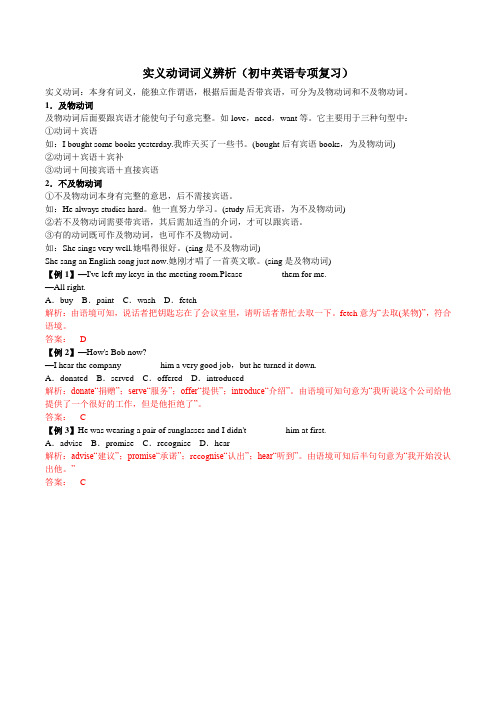
实义动词词义辨析(初中英语专项复习)实义动词:本身有词义,能独立作谓语,根据后面是否带宾语,可分为及物动词和不及物动词。
1.及物动词及物动词后面要跟宾语才能使句子句意完整。
如love,need,want等。
它主要用于三种句型中:①动词+宾语如:I bought some books yesterday.我昨天买了一些书。
(bought后有宾语books,为及物动词)②动词+宾语+宾补③动词+间接宾语+直接宾语2.不及物动词①不及物动词本身有完整的意思,后不需接宾语。
如:He always studies hard。
他一直努力学习。
(study后无宾语,为不及物动词)②若不及物动词需要带宾语,其后需加适当的介词,才可以跟宾语。
③有的动词既可作及物动词,也可作不及物动词。
如:She sings very well.她唱得很好。
(sing是不及物动词)She sang an English song just now.她刚才唱了一首英文歌。
(sing是及物动词)【例1】—I've left my keys in the meeting room.Please ________ them for me.—All right.A.buy B.paint C.wash D.fetch解析:由语境可知,说话者把钥匙忘在了会议室里,请听话者帮忙去取一下。
fetch意为“去取(某物)”,符合语境。
答案:__D__【例2】—How's Bob now?—I hear the company ________ him a very good job,but he turned it down.A.donated B.served C.offered D.introduced解析:donate“捐赠”;serve“服务”;offer“提供”;introduce“介绍”。
由语境可知句意为“我听说这个公司给他提供了一个很好的工作,但是他拒绝了”。
初中英语中考专题复习——动词语境辨析(实义动词+近义动词+感官动词)
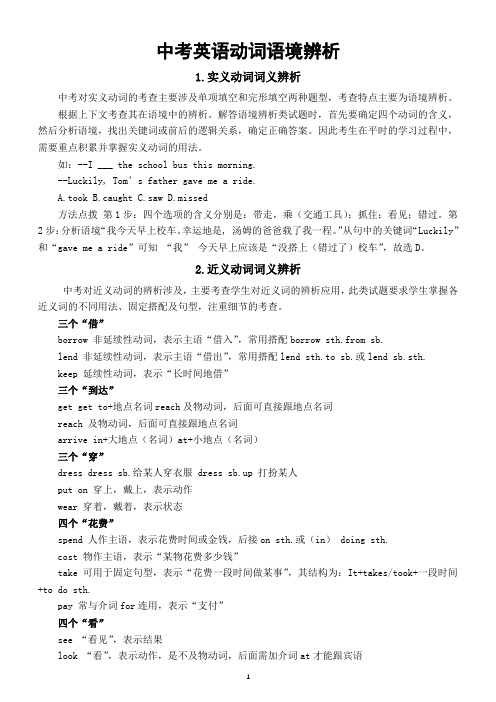
中考英语动词语境辨析1.实义动词词义辨析中考对实义动词的考查主要涉及单项填空和完形填空两种题型,考查特点主要为语境辨析。
根据上下文考查其在语境中的辨析。
解答语境辨析类试题时,首先要确定四个动词的含义,然后分析语境,找出关键词或前后的逻辑关系,确定正确答案。
因此考生在平时的学习过程中,需要重点积累并掌握实义动词的用法。
如:--I ___ the school bus this morning.--Luckily, Tom’s father gave me a ride.A.tookB.caughtC.sawD.missed方法点拨第1步:四个选项的含义分别是:带走,乘(交通工具);抓住;看见;错过。
第2步:分析语境“我今天早上校车。
幸运地是, 汤姆的爸爸载了我一程。
”从句中的关键词“Luckily”和“gave me a ride”可知“我”今天早上应该是“没搭上(错过了)校车”,故选D。
2.近义动词词义辨析中考对近义动词的辨析涉及,主要考查学生对近义词的辨析应用,此类试题要求学生掌握各近义词的不同用法、固定搭配及句型,注重细节的考查。
三个“借”borrow 非延续性动词,表示主语“借入”,常用搭配borrow sth.from sb.lend 非延续性动词,表示主语“借出”,常用搭配lend sth.to sb.或lend sb.sth.keep 延续性动词,表示“长时间地借”三个“到达”get get to+地点名词reach及物动词,后面可直接跟地点名词reach 及物动词,后面可直接跟地点名词arrive in+大地点(名词)at+小地点(名词)三个“穿”dress dress sb.给某人穿衣服 dress sb.up 打扮某人put on 穿上,戴上,表示动作wear 穿着,戴着,表示状态四个“花费”spend 人作主语,表示花费时间或金钱,后接on sth.或(in) doing sth.cost 物作主语,表示“某物花费多少钱”take 可用于固定句型,表示“花费一段时间做某事”,其结构为:It+takes/took+一段时间+to do sth.pay 常与介词for连用,表示“支付”四个“看”see “看见”,表示结果look “看”,表示动作,是不及物动词,后面需加介词at才能跟宾语watch “观看(比赛、电视等)”read “看(书、报等)”,表示阅读四个“说”speak 作及物动词时后接表示语言的名词,表示“说,讲述”say 常跟直接引语或间接引语,表示说的内容talk 是不及物动词,常跟介词to和with,意为“同……谈话”,也表示具有说话能力tell 意为“告诉”,与story连用,意为“讲故事”四个“拿”bring “带来,拿来”,表示拿到靠近说话人的地方take “拿去,带走”,表示拿到远离说话人的地方carry “扛,搬,用力移动”,没有方向fetch “去取,去拿”,表示往返拿东西四个“赢,输”lose 意为“输给”某人,固定搭配为lose to sb.fail 意为“失败”或“未做成某事”beat 意为“打败”,后接人或某支队伍win 意为“赢得,荣誉,地位,比赛等”四个“参加”join 一般指加入“党派”或“组织”并成为其中一员,如参军,入党,入团等join in 指参加竞赛、娱乐、游戏等活动take part in 指参加聚会或群众性活动attend 一般指出席会议、典礼、婚礼等四个“变化”turn 一般用于颜色的变化get 天变黑、变长或变短become 天气变暖或变冷等,表示渐变grow 形状变大或变小3.感官动词词义辨析sound 意为“听起来……”指听觉。
(英语)初中英语动词基本形式易错剖析及解析

(英语)初中英语动词基本形式易错剖析及解析一、动词基本形式1.The girl is greatly interested in the song. The lyrics of it her thoughts and feelings.A. expressB. discussC. expectD. imagine【答案】 A【解析】【分析】句意:那个女孩对那首歌很感兴趣。
它的歌词表达了她的想法和情感。
A. 表达,B. 讨论,C. 期待,D. 想象,根据句意可知歌词表达了她的想法和情感,故选A。
【点评】本题考查动词辨析。
熟记这些动词的意义和用法。
2.—Listen, the music sweet.—It's Yesterday Once More, my favorite.A. soundsB. smellsC. feelsD. looks【答案】A【解析】【分析】句意:—听,这音乐听起来很甜美。
—是昨日重现,我最爱的音乐。
music“音乐”应该是“听起来”很甜美。
sound符合句意。
故答案为A。
【点评】考查动词辨析,注意感官动词的用法。
3.The girl has a boyfriend Bill.A. callB. calledC. is calledD. is calling【答案】 B【解析】【分析】句意:那个女孩有个名叫比尔的男朋友。
此题考查过去分词做定语。
called名叫......的。
故选B。
【点评】考查动词的不同形式。
4.My sister used to _____ thin and short, but now she is tall.A. beB. wasC. hasD. have【答案】 A【解析】【分析】根据thin and short又瘦又矮,可知此处填动词be。
used to do sth.过去常常做某事。
故选A。
【点评】考查动词原形。
5.—It's going to rain. Remember to __________ your umbrella with you when you go to school, dear.—All right, Mum. Bye!A. takeB. buyC. put【答案】 A【解析】【分析】句意:——要下雨了,去上学的时候记得带一把伞哦。
初中英语动词短语辨析教案及解析(1)
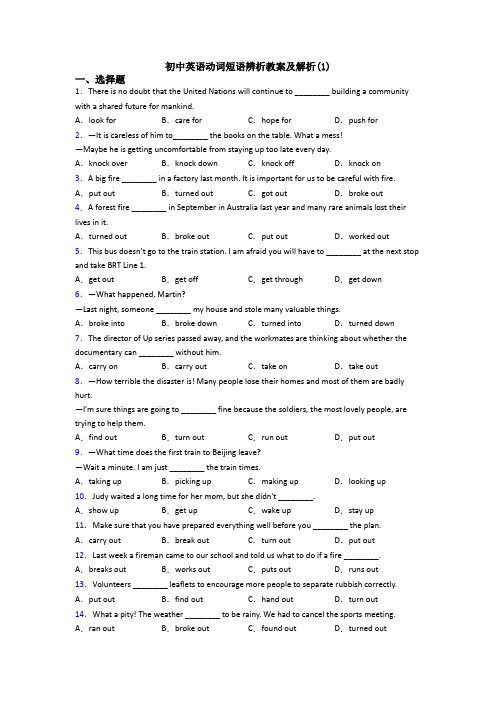
初中英语动词短语辨析教案及解析(1)一、选择题1.There is no doubt that the United Nations will continue to ________ building a community with a shared future for mankind.A.look for B.care for C.hope for D.push for2.—It is careless of him to________ the books on the table. What a mess!—Maybe he is getting uncomfortable from staying up too late every day.A.knock over B.knock down C.knock off D.knock on3.A big fire ________ in a factory last month. It is important for us to be careful with fire. A.put out B.turned out C.got out D.broke out4.A forest fire ________ in September in Australia last year and many rare animals lost their lives in it.A.turned out B.broke out C.put out D.worked out 5.This bus doesn’t go to the train station. I am afraid you will have to ________ at t he next stop and take BRT Line 1.A.get out B.get off C.get through D.get down 6.—What happened, Martin?—Last night, someone ________ my house and stole many valuable things.A.broke into B.broke down C.turned into D.turned down 7.The director of Up series passed away, and the workmates are thinking about whether the documentary can ________ without him.A.carry on B.carry out C.take on D.take out 8.—How terrible the disaster is! Many people lose their homes and most of them are badly hurt.—I’m sure thing s are going to ________ fine because the soldiers, the most lovely people, are trying to help them.A.find out B.turn out C.run out D.put out 9.—What time does the first train to Beijing leave?—Wait a minute. I am just ________ the train times.A.taking up B.picking up C.making up D.looking up 10.Judy waited a long time for her mom, but she didn't ________.A.show up B.get up C.wake up D.stay up 11.Make sure that you have prepared everything well before you ________ the plan. A.carry out B.break out C.turn out D.put out12.Last week a fireman came to our school and told us what to do if a fire ________. A.breaks out B.works out C.puts out D.runs out 13.Volunteers ________ leaflets to encourage more people to separate rubbish correctly. A.put out B.find out C.hand out D.turn out 14.What a pity! The weather ________ to be rainy. We had to cancel the sports meeting. A.ran out B.broke out C.found out D.turned out15.Please _____ the water when you brush your teeth.A.take down B.turn up C.take away D.turn off16.I’ve had some difficulties, but they were nothing compared _____ yours.A.to B.of C.for D.from17.All of us had a good time during this year’s May Day holiday because we ________ five days________ .A.had...off B.took...off C.put...off D.turned...off 18.—Hello, this is Taicang Middle School.—I want to talk to Mr. Chen. Can you ________ me ________?A.put…in B.put…out C.put…through D.put…up19.The rain has stopped. Why not ________ the raincoat?A.take away B.pass away C.put away D.put off 20.There’s no d oubt the Belt and Road will successfully ________ cooperation and development between China and other countries along the line.A.push for B.care for C.look for D.hope for21.The book is written by T. C.Smith.What does the “T. C.”?A.pay attention to B.regard as C.stand for D.set off22.—I ________ reading English every morning.—Yes, English is very important and it ________ the first language in England and some other countries.A.used to; is used by B.used to; is used asC.am used to; is used as D.am used to; is used by23.—How was your May Day holiday?—Just so-so. We drove to Suzhou and tried to find a place for parking, but they were all________. A.turned up B.stayed up C.taken up D.put up 24.Would you please ____________ the light? I can't sleep well with it on.A.turn on B.turn off C.turn to D.turn around 25.—I’m sorry to ________ on you, but there is something I don’t understand.—It doesn’t matter.A.cut down B.cut out C.cut in D.cut off26.Far water does not ________ near fire.A.put up B.put away C.put out D.put in27.—In order to improve my English, I have already made a detailed plan.—Great! I think all you need to do next is _________.A.pick it out B.carry it out C.find it out D.point it out 28.Much to everyone’s surprise, Hi, Mom ________ to be a biggest hit.A.turns out B.puts out C.carries out D.breaks out 29.The job ________ to be harder than they thought.A.found out B.turned out C.ran out D.worked out30.Andrew once tried to ________ a brighter light in his bedroom, but he failed in the end. A.put on B.put in C.put out D.put up31.I promise I won’t ________ any more of your time. But would you please reply to my question right away?A.give up B.make up C.put up D.take up32.-Oh,my God! I have ________ five pounds!-No worries. It’s normal for a growing teenage girl.A.put up B.put down C.put on D.put off 33.—Many students don’t know how to ________ stress and become worried.—I think they’d better ask their teachers for help.A.argue with B.come up with C.deal with34.Bob is busy taking the desks and chairs away because they ___________ too much room in the hall.A.pick up B.take up C.put up D.cheer up 35.—All right, I’ll take it. But I tell you, it is the last time I will _________ this kind of work —Come on, Buddy! Don’t be so serious.A.take off B.take out C.take on D.take up36.— Excuse me, which is the way to Kaiming Middle School?—________ this street, and you’ll find it on your right.A.Write down B.Go down C.Lie down D.Sit down37.As a volunteer, he often goes to the hospital to ________ the sick.A.cheer for B.help for C.put up D.cheer up38.My brother often _________ his spare time to help me with my spoken English.A.puts up B.gives up C.opens up D.tidies up 39.Daniel, stop playing computer games, please! It has ________ your free time too much. A.turned up B.picked up C.put up D.taken up 40.—Why did Linda come to China?—To experience Chinese culture and ________ the most suitable university to attend.A.turn out B.put out C.run out D.find out41.Life is full of ups and downs. When your friends are unhappy, tell them something funny and encourage them to ________.A.put up B.cheer up C.stay up D.give up42.The person who ________ a new idea of how to work out the puzzle will be given a(n)________.A.keeps up with; praise B.comes up with; prize C.ends up with; price D.puts up with; award43.—Your spoken English is very good. How do you improve it?—Thanks. Mrs. Wang always asks us to ________ dialogues in our English classes and practice speaking English as often as possible.A.take up B.make up C.put up D.mop up44.—Who is the best basketball player in your class?—Daniel. And he takes any chance to ________ his sports skills to girls.A.take off B.turn off C.fall off D.show off45.________ the way you talk. You won’t want to make others feel uncomfortable.A.Pay attention to B.Hold on toC.Come up with D.End up with46.If parents do everything for their children, they won’t learn to ________ themselves. A.depend on B.get on C.put on D.come on47.My father is crazy abou t DIY. He’s trying to ________ a cupboard in the kitchen.A.put up B.put in C.put on D.put away48.I know how busy you must be and I wouldn’t want to ________ too much of your time. A.put up B.take up C.set up D.make up 49.—Have you made a plan to raise money to protect the animals in danger?—Yes. Now we are thinking about how to ________.A.pick it out B.carry it out C.find it out D.put it out 50.The baby is sleeping. Would you please ________?A.turned the radio on B.turn the radio downC.turned the radio off D.turn the radio up【参考答案】***试卷处理标记,请不要删除一、选择题1.D解析:D【详解】句意:毫无疑问,联合国将继续推动构建人类命运共同体。
初中词义辨析英语总结
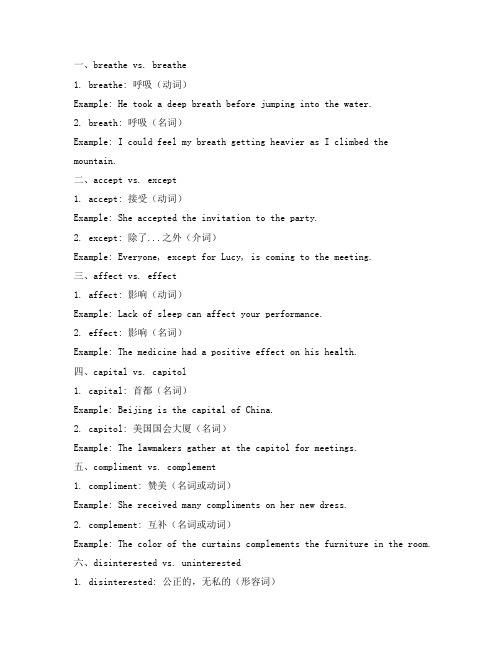
一、breathe vs. breathe1. breathe: 呼吸(动词)Example: He took a deep breath before jumping into the water.2. breath: 呼吸(名词)Example: I could feel my breath getting heavier as I climbed the mountain.二、accept vs. except1. accept: 接受(动词)Example: She accepted the invitation to the party.2. except: 除了...之外(介词)Example: Everyone, except for Lucy, is coming to the meeting.三、affect vs. effect1. affect: 影响(动词)Example: Lack of sleep can affect your performance.2. effect: 影响(名词)Example: The medicine had a positive effect on his health.四、capital vs. capitol1. capital: 首都(名词)Example: Beijing is the capital of China.2. capitol: 美国国会大厦(名词)Example: The lawmakers gather at the capitol for meetings.五、compliment vs. complement1. compliment: 赞美(名词或动词)Example: She received many compliments on her new dress.2. complement: 互补(名词或动词)Example: The color of the curtains complements the furniture in the room.六、disinterested vs. uninterested1. disinterested: 公正的,无私的(形容词)Example: The judge must be disinterested in order to make a fair decision.2. uninterested: 不感兴趣的(形容词)Example: He seemed uninterested in the topic of the conversation.七、hear vs. listen1. hear: 听见(动词)Example: I can hear the birds singing outside.2. listen: 听(动词)Example: Please listen to what I have to say.八、loose vs. lose1. loose: 宽松的(形容词)Example: The dress is too loose for me.2. lose: 失去(动词)Example: I don't want to lose my keys again.九、principal vs. principle1. principal: 校长(名词)Example: The principal gave a speech at the graduation ceremony.2. principle: 原则(名词)Example: He refused to compromise his principles.十、stationary vs. stationery1. stationary: 静止的(形容词)Example: The car remained stationary at the traffic light.2. stationery: 文具(名词)Example: I bought some new stationery for school.以上是初中词义辨析英语总结的相关内容,希望对大家有所帮助。
初中英语常用动词搭配和动词短语以及辨析
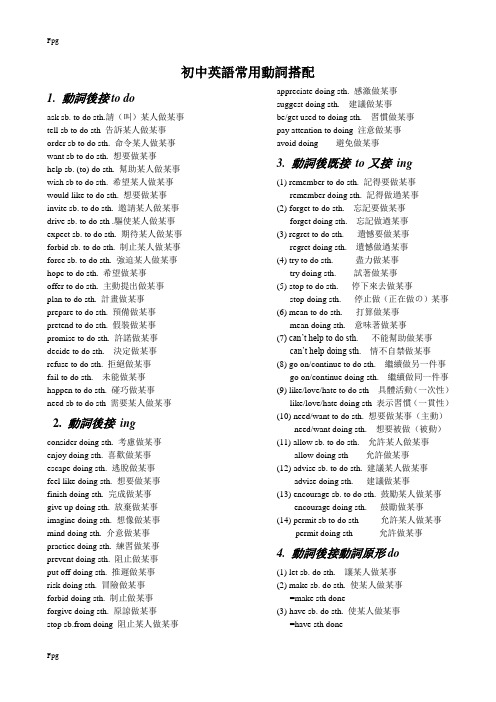
初中英語常用動詞搭配1. 動詞後接to doask sb. to do sth.請(叫)某人做某事tell sb to do sth 告訴某人做某事order sb to do sth. 命令某人做某事want sb to do sth. 想要做某事help sb. (to) do sth. 幫助某人做某事wish sb to do sth. 希望某人做某事would like to do sth. 想要做某事invite sb. to do sth. 邀請某人做某事drive sb. to do sth .驅使某人做某事expect sb. to do sth. 期待某人做某事forbid sb. to do sth. 制止某人做某事force sb. to do sth. 強迫某人做某事hope to do sth. 希望做某事offer to do sth. 主動提出做某事plan to do sth. 計畫做某事prepare to do sth. 預備做某事pretend to do sth. 假裝做某事promise to do sth. 許諾做某事decide to do sth. 決定做某事refuse to do sth. 拒絕做某事fail to do sth. 未能做某事happen to do sth. 碰巧做某事need sb to do sth 需要某人做某事2.動詞後接ingconsider doing sth. 考慮做某事enjoy doing sth. 喜歡做某事escape doing sth. 逃脫做某事feel like doing sth. 想要做某事finish doing sth. 完成做某事give up doing sth. 放棄做某事imagine doing sth. 想像做某事mind doing sth. 介意做某事practice doing sth. 練習做某事prevent doing sth. 阻止做某事put off doing sth. 推遲做某事risk doing sth. 冒險做某事forbid doing sth. 制止做某事forgive doing sth. 原諒做某事stop sb.from doing 阻止某人做某事appreciate doing sth. 感激做某事suggest doing sth. 建議做某事be/get used to doing sth. 習慣做某事pay attention to doing 注意做某事avoid doing 避免做某事3. 動詞後既接to又接ing(1) remember to do sth. 記得要做某事remember doing sth. 記得做過某事(2)forget to do sth. 忘記要做某事forget doing sth. 忘記做過某事(3) regret to do sth. 遺憾要做某事regret doing sth. 遺憾做過某事(4) try to do sth. 盡力做某事try doing sth. 試著做某事(5)stop to do sth. 停下來去做某事stop doing sth. 停止做(正在做の)某事(6) mean to do sth. 打算做某事mean doing sth. 意味著做某事(7) can’t help to do sth. 不能幫助做某事can’t help doing sth. 情不自禁做某事(8) go on/continue to do sth. 繼續做另一件事go on/continue doing sth. 繼續做同一件事(9) like/love/hate to do sth 具體活動(一次性)like/love/hate doing sth 表示習慣(一貫性)(10) need/want to do sth. 想要做某事(主動)need/want doing sth. 想要被做(被動)(11) allow sb. to do sth. 允許某人做某事allow doing sth 允許做某事(12) advise sb. to do sth. 建議某人做某事advise doing sth. 建議做某事(13) encourage sb. to do sth. 鼓勵某人做某事encourage doing sth. 鼓勵做某事(14) permit sb to do sth 允許某人做某事permit doing sth 允許做某事4. 動詞後接動詞原形do(1) let sb. do sth. 讓某人做某事(2) make sb. do sth. 使某人做某事=make sth done(3)have sb. do sth. 使某人做某事=have sth done(4)see sb. do sth. 看見某人做過某事see sb. doing 看見某人正在做某事(5)hear sb. do sth. 聽見某人做過某事hear sb. doing 聽見某人正在做某事(6)find sb. do sth. 發現某人做過某事find sb. doing sth. 發現某人正在做某事(7)watch sb. do sth. 察看某人做某事(8)had batter do sth. 最好做某事4.接雙賓語(一)雙賓語易位時需借助介詞toの常用動詞(多表示動詞の方向)bring sb. sth. = bring sth. to sb. 把某物帶給某人hand sb. sth. =hand sth. to sb. 把某物遞給某人lend sb. sth. = lend sth. to sb. 把某物借給某人mail sb. sth. = mail sth. to sb. 把某物寄給某人offer sb. sth. = offer sth. to sb. 將某物給某人pass sb. sth. = pass sth. to sb. 把某物遞給某人pay sb. sth. = pay sth. to sb. 付給某人某物(錢)read sb. sth. = read sth. to sb. 把某物讀給某人聽return sb. sth. = return sth. to sb. 把某物還給某人sell sb. sth. = sell sth. to sb. 把某物賣給某人send sb. sth. = send sth. to sb. 把某物送給某人show sb. sth. = show sth. to sb. 拿某物給某人看take sb. sth. = take sth. to sb. 把某物拿給某人teach sb. sth. = teach sth. to sb. 教某人某物tell sb. sth. = tell sth. to sb. 告訴某人某情況throw sb. sth. = throw sth. to sb. 把某物扔給某人write sb. sth. = write sth. to sb. 給某人寫信(二)雙賓語易位時需借助介詞forの常用動詞(多表示動詞の目の)book sb. sth. = book sth. for sb. 為某人預定某物buy sb. sth. = buy sth. for sb. 為某人買某物choose sb. sth. = choose sth. for sb. 為某人選某物cook sb. sth. = cook sth. for sb. 為某人煮某物draw sb. sth. = draw sth. for sb. 為某人畫某物find sb. sth. = find sth. for sb. 為某人找到某物get sb. sth. = get sth. for sb. 為某人拿來某物make sb. sth. = make sth. for sb. 為某人做某物order sb. sth. = order sth. for sb. 為某人訂購某物pick sb. sth. = pick sth. for sb. 為某人採摘某物prepare sb. sth. = prepare sth. for sb. 為某人準備某物save sb. sth. = save sth. for sb. 為某人留某物sing sb. sth. = sing sth. for sb. 為某人唱某物(歌)steal sb. sth. = steal sth. for sb. 為某人偷某物初中英語常用動詞短語整理5. Be 動詞結構be able to do 能夠做……be afraid to do (內心)害怕\不敢做某事be afraid of doing擔心出現doingの狀況、結果be angry with 對……生氣be at home = stay at home 待在家裏be back/in/out 回來/在家/外出be bad for 對……有害be busy doing/with sth忙於做……(忙於……) be careful of 當心,注意,仔細be covered with 被……覆蓋be different from與……不同be famous/known as 作為……出名be famous/known for 以……而著名be free 空閒の,有空be friendly/kind to對……友好be from = come from 來自…,什麼地方人be full of/filled with裝滿……be good at= do well in 擅長於…be good for對……有好處be (ill) in bed 臥病在床be interested in 對……感興趣be in trouble 處於困境中be late for 遲到be mad at 對……生氣be made from/of 由……製成be made in 在……地方製造be made up of由……構成be on 在進行,在上演,(燈)亮著be pleased with對…感到高興be polite/impolite to對某人有禮貌/不禮貌be popular with受……歡迎;be proud of對……感到自豪be ready for 為……作好準備be satisfied with對……感到滿意(高興)be surprised (at) 對……感到驚訝be strict in sth.對某事嚴格be strict with sb.對某人嚴格be supposed to do sth.應該做某事be used for doing被用來做某事be used to do被用來做某事be used to doing 習慣於be worried about =be anxious about 擔憂6.短語(首字母排列)aim at 針對…agree with sb. 同意某人の意見或建議ask for請求、索要ask for a day off請一天假add…to…把…和…加起來achieve a victory取得勝利arrive in到達﹙大地方﹚arrive at到達﹙小地方﹚argue with 與…爭吵apologize to 向…道歉break up with sb.與某人斷絕關係break out 爆發break down 出毛病,拆開break off解散,解雇break the rule違規break into破門而入believe in信任begin/start with以…開始belong to屬於…built…into…把…建成…base on以…為基礎borrow…from…向…借……come into being形成、出現come true 實現come for a visit來參觀come on 快,走吧,跟我來come back回來come to do sth.逐漸做某事come about 發生come from來自…come up with 提出主意想法come along出現、發生come over過來come into進入…裏come in 進來come out出來,出現,出版come out of從…裏出來catch up with 趕上…catch a fire著火catch hold of抓住…catch a bus趕公共汽車cut up 切碎cut in half 切成半cut off切斷﹙電源、水源﹚cut in line插隊care for關心、關愛care about在意call for號召call back回電話call at sp. 拜訪某地call on sb.拜訪某人call out呼喊call up給…打電話call sb. at some number給某人打某個號碼calm down 鎮靜下來communicate with 與…交流complain about 抱怨…can’ t wait to do sth.迫不及待做某事clean up 清理、打掃乾淨carry out 執行connect …to…把…和…連起來chat on line網上聊天check over檢查drop by 順便拜訪drop out of school輟學drop litter丟垃圾do an experiment 做實驗do an operation on sb. 給某人做手術do sth. in person親自做某事do business做生意do exercise 做操do with=deal with處理do wrong 做錯事do one’s homework =do one’lesson做作業do some sports做運動do morning exercises 做早操do well in做得好,擅長於do the dishes 洗餐具do one’s best to do sth.盡力做某事do some cleaning 掃除do some reading讀書do some shopping購物do some cooking做飯do the laundry洗衣服do some chores做雜務disagree with sb. 不同意某人意見describe…as…把…描繪為…die of 死於﹙直接內因,如疾病、饑渴﹚die from死於﹙間接外因,如車禍、天災﹚die out 滅絕drive sb. crazy使某人發瘋drive to…開車去…divide…into…把…分成…depend on依賴…decide on sth. 對……做決定dry out乾涸dry up 烘乾dream of 夢想…draw up起草、擬定dress up 裝扮、打扮e-mail sb.給某人發電子郵件enjoy oneself 玩得愉快enjoy doing sth. 喜歡做某事end up doing sth.結束做某事explain to sb sth=explain sth. to sb. 向某人解釋某事eat up吃光fall behind落後fall off 從……掉下fall down 滑到,倒下(後接賓語要加from)fall over向前摔倒、跌倒fall into 落入;陷入fall ill病倒fall asleep入睡fall in love with愛上、迷戀fight against與…作鬥爭follow the rules 遵守規則fail the exam考試不及格find out查明﹙原因、真相﹚feel like doing 想做某事fly a kite 放風箏fly to乘飛機去…fit into …適應…fill in =fill out 填充填寫fill…with…用…填…feel sorry for因…而難過fold the clothes疊衣服get on 上﹙車、船、飛機等﹚get off下﹙車、船、飛機等﹚get up起來、起床get good grades 取得好成績get over 客服get rid of 除掉…get to到達get out of 從…裏出來get into 進入get in the way of妨礙get together 聚會get into trouble陷入困境get out of trouble 脫離困境get used to﹙doing﹚sth.習慣﹙做﹚某事get to do sth.著手做某事get ready for為…做準備get sb. into trouble使某人陷入困境get away from遠離…get a sore back 背痛get back to sb. 過會兒與某人通話﹙打電話用語﹚get on/along well with 與相處…融洽get to know認識get married to與某人結婚get in touch with 與…取得聯繫go ahead 先走,向前走,去吧,幹吧go to…去…go home 回家go out 出去go out for…出去做…go down/along 沿著…走go to school上學go to the doctor’去醫務室go to the cinema 去看電影go across…穿過…﹙平面﹚go to work上班go bad變壞go by流逝﹙時間﹚go one’s own way走自己の路go for a walk 去散步go sightseeing去觀光go away 走開go to sleep 入睡go to bed 上床睡覺go on with繼續…go shopping 去購物go hiking 去遠足go abroad 出國go over復習go downstairs/upstairs下樓/上樓go on a trip 去旅遊give in﹙doing﹚sth.屈服﹙做﹚某事give up﹙doing﹚sth.放棄﹙做﹚某事give away 贈送give out 頒發give back 歸還give off 發出﹙氣味、煙霧等﹚give sb. some advice給某人提建議give a talk作報告give lessons to sb. 給某人上課give sb. a good beating 好好教訓某人一下give sb. a hand 幫某人忙grow up 長大have a good time 玩得愉快have a discussion 進行討論have a party 舉行聚會have a meeting 開會have nothing to do with與…無關have trouble with sth. 做某事有困難have difficulty/ trouble doing sth. 費力做某事have fun玩得愉快have a fever 發燒have a cold 感冒have a cough 咳嗽have a stamachache胃痛have fun doing sth.愉快地做某事have a match 舉行比賽have a fight with與…比賽、鬥爭have no idea of 不知道…have a hard time doing sth. 艱難地做某事have sth. to do with 與…有關have an accident 發生事故have breakfast/lunch/supper 吃早、午、晚飯have class上課have water喝水have a conversation with 與…會話have a look at 看一下…have a talk with與…談話have a problem with做某事有疑難have a good trip路途愉快have a try 試一下have a laugh at 嘲笑.…have a pity on sb.同情某人have a rest 休息一下have a word with 與……談幾句話hear of 聽說hear from 收到…の來信hands up舉手hand in上交hand out分發hold up 抓住、握住hold a meeting 舉行會議hold an exhibition舉行展覽happen to do sth.恰巧做某事hurry up 趕快hurry off 匆忙離開help oneself to sth. 隨便用…help sb. with sth.幫助某人做某事It’s one’s turn to do sth. 輪到某人做某事invite sb. to do sth.邀請某人做某事insist on doing sth..堅持做某事join in 穿著join together團結起來join the army 參軍join the party入黨keep(stay)away from 遠離keep out不讓進入keep down 壓低﹙音量等﹚keep a pet 飼養寵物keep in good mood 保持好心情keep on doing一直做某事keep healthy保持健康keep in good health保持健康keep up with跟上…keep sb. doing sth. 使某人一直做某事keep off 防禦keep in touch with與…保持聯繫knock at=knock on敲…knock into撞到某人身上learn…by oneself 自學…learn…from …向…學習learn…by heart 記住…leave for離開去某處leave sth. somewhere 把某物忘在某處leave school畢業leave one by oneself 把某人單獨留下leave a message for sb.給某人留個口信lead to導致live on…以…為生live a happy life 過著幸福の生活look after照看…look for 尋找…look down on 藐視…look up查找﹙字詞等﹚look over檢查﹙身體等﹚look forward to盼望…look on …as 把看作…look at看…look like 看起來像…look around環顧look out當心look out of 向…外面看look through 流覽look the same 看起來一樣look inside向…裏面看laugh at嘲笑lose touch with與…失去聯繫let sb. in 讓某人進去lie dowm躺下make sb. feel at home使某人感到賓至如歸make one’s mind to do sth. 決心做某事make a face=make faces 做鬼臉make money掙錢make fool of sb.愚弄某人make a journey旅行make progress 取得進步make a countribution to為…做貢獻make a noise 吵鬧make a fire 生火make a mistake 犯錯誤make…of…由…製作…﹙看出原材料﹚make…from…由…製作…﹙看不出原材料﹚make up編造,虛構,打扮,構成,組成make up of…由…組成make a plan 定計劃make one’s bed 整理床鋪make a report 編寫報告make sure of確信…make use of 利用…make a sentence with用…造句make a decision做出決定make oneself understood 表達自己の意思make a survey of 調查…make preparation for 為…做準備make friends with與……交朋友make a living謀生major in專修match …with …把…和…搭配起來move to搬到…mistake…for…把…錯認為…meet with 遇到﹙困難、麻煩等﹚mix up混合name sb./sth.X把某人/某物叫做Xorder sb. to do sth.命令某人做某事open up完全打開play football 踢足球play chess 下棋play cards打牌play bridge打橋牌play the guitar 彈吉他play the violin彈小提琴play sports 做運動play games 玩遊戲play with 玩耍…play jokes on sb.對某人開玩笑play the CD.播放play the music 播放音樂play a part in在…中扮演角色play a role of 扮演…の角色play against與…比賽play hide-and-seek捉迷藏pay for付…款pay attention to 注意…pass by 路過…put on 穿上、上映put down 寫下put away把…收拾起來put…into…把…放入…裏put up 舉起、張貼put out 熄滅put off 推遲put back 放回prevent sb.﹙from﹚doing sth.阻止某人做某事prefer to do rather than do與做另一件事相比更喜歡做某事prefer﹙doing﹚sth. to ﹙doing﹚sth. 與…相比更喜歡…point to 指向poin at 指著point out指出practice doing sth.練習做某事pick up 拾起,接人,站起,收聽run away 逃跑run after 追趕run out of 用光、從…裏跑出來run over to…跑過去到…read sth. to sb. 把某物讀給某人聽read sth. for sb. 替某人讀某物receive a letter from…收…到來信rain heavily 下大雨ride a bike騎自行車rise up升起raise money 籌集資金refer to涉及、提到regard…as…把…看作…reach out 伸出﹙手等﹚send up發射send an e-mail 發送電子郵件send for…派人請…send…for…派…請…send into 送入…裏send away驅逐send off解雇send out 發出,發出,派遣shake hands with與…握手stick…into…把…插入…裏stick doing sth.堅持做某事stop sb. from doing sth.阻止某人做某事stare at 盯著…sell out買光see a doctor 看醫生see sb. off為某人送行see a film 看電影say goodbye to sb.向某人告別say hello to sb.向某人問好set up 豎立、建造set up one’s mind on sth.全神貫注於…set off 出發,動身,使爆炸,引起set out 出發,啟程,開始,著手set an example for 為……樹立榜樣speak of 講到speak highly of 稱頌…search for 搜索,尋找start to do sth.著手做某事start with …以…開始spend﹙time/money﹚on sth.= spend﹙time/money﹚﹙in﹚doing sth.花費﹙時間/金錢﹚做某事spend time with sb. 和某人呆在一起sort…into…把…劃分成…show sb. around somewhere領某人參觀某處show up 露面stay in bed 呆在床上slow down減速smile at對…微笑suit sb.適合某人share…with…與…分享…stay up 熬夜stand for代表,象徵stand up起立succeed in doing sth.成功地做某事shut up關閉shout to (為了讓人聽到)對…喊shout at (因生氣等)向…喊seem like 好像sweep the floor拖地step on 踐踏,踩take a message for sb.給某人捎個信take a bus乘工交車take one’s order按某人の順序take a walk 散步take…to…把…帶到…去take a shower淋浴take after 與…相像take away 帶走take the medicine 服藥take exercise鍛煉take it easy不要緊take one’s temperature量某人の體溫take off 起飛/脫下﹙衣服、鞋帽等﹚take a lesson/class 上課take a day off 休一天假take an exam 參加考試take…out of…把…從…中取處來take a rest休息一下take one’s turn to do sth.按某人順序做某事take part in 參加﹙活動﹚take…as an example拿…當作例子take over接管take care of照顧、照看take in吸取,吸收take up 佔據﹙空間、時間﹚take the pride in 以…而驕傲﹙強調動作﹚take place 發生﹙不及物﹚take the leading position占主導地位take a swimming course上游泳課take a deep breath深呼吸take the place of 代替…take a photo of 照…の相talk about談論…talk with 與…談話talk to對…談話turn left﹙right﹚向左﹙右﹚轉turn up 調高﹙音量等﹚turn down調低﹙音量等﹚turn on打開﹙電器、煤氣、水龍頭﹚turn off 關閉﹙電器、煤氣、水龍頭﹚turn over翻開,翻轉turn…into…把…變成…turn to…轉向…turn green 變綠think about考慮、思考…think of想起、想到…think over仔細考慮think up想出(設計出、發明、編造)tell sb. about sth. 把某物の情況告訴某人tell a joke 講笑話tell a story 講故事try on 試穿try one’s best to do sth. .盡力做某事thanks for感謝…travel to …到…旅行tie…to…把…綁到…上treat …as…把…當作…來對待trouble sb. to do sth. 麻煩某人做某事throw away 扔掉translate…into…把…翻譯成…urge sb. to do sth. 強烈要求某人做某事use up用盡used to do sth. 過去經常做某事visit sb/somewhere看望某人/參觀某處wake up醒來、叫醒welcome to…歡迎到…來wait for等待…wait in line 排隊等候write to …給…寫信write down記下win the World Cup 贏得世界盃win a prize獲獎wear out穿壞wear glasses戴眼鏡wipe off 擦去,拭去work out 解決﹙問題、麻煩等﹚work on從事…walk along/down 沿著…走watch a game觀看比賽warn sb. to do sth.告誡某人做某事warn sb. of sth. 警告某人某事warn sb. against(doing) sth.告誡某人當心某事/不要做某事worry about…擔心…中考英語近義動詞(片語)辨析1. 辨析take;cost;spend;pay主語為人の有spend和pay;主語為物の有cost;主語常為“it”の有take.(1)spend多用人作主語,後接金錢或時間。
初中英语常用动词搭配和动词短语以及辨析(K12教育文档)
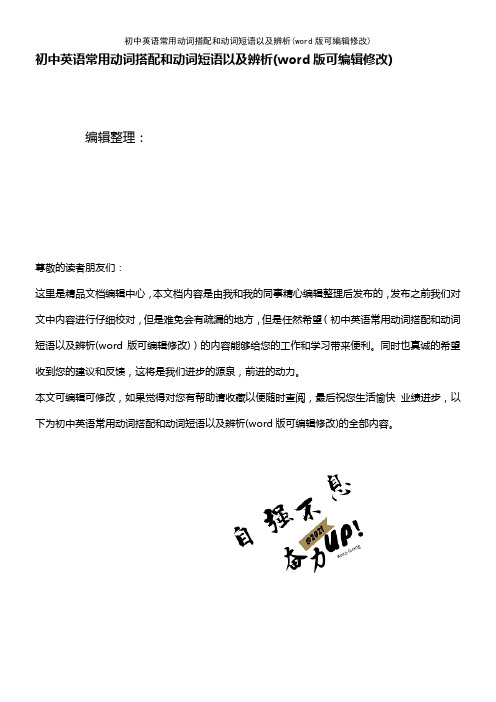
初中英语常用动词搭配和动词短语以及辨析(word版可编辑修改)编辑整理:尊敬的读者朋友们:这里是精品文档编辑中心,本文档内容是由我和我的同事精心编辑整理后发布的,发布之前我们对文中内容进行仔细校对,但是难免会有疏漏的地方,但是任然希望(初中英语常用动词搭配和动词短语以及辨析(word版可编辑修改))的内容能够给您的工作和学习带来便利。
同时也真诚的希望收到您的建议和反馈,这将是我们进步的源泉,前进的动力。
本文可编辑可修改,如果觉得对您有帮助请收藏以便随时查阅,最后祝您生活愉快业绩进步,以下为初中英语常用动词搭配和动词短语以及辨析(word版可编辑修改)的全部内容。
初中英语常用动词搭配1. 动词后接to doask sb. to do sth。
请(叫)某人做某事tell sb to do sth 告诉某人做某事order sb to do sth。
命令某人做某事want sb to do sth. 想要做某事help sb. (to) do sth。
帮助某人做某事wish sb to do sth。
希望某人做某事would like to do sth. 想要做某事invite sb. to do sth。
邀请某人做某事drive sb。
to do sth 。
驱使某人做某事expect sb. to do sth. 期待某人做某事forbid sb。
to do sth. 制止某人做某事force sb. to do sth。
强迫某人做某事hope to do sth。
希望做某事offer to do sth. 主动提出做某事plan to do sth. 计划做某事prepare to do sth。
预备做某事pretend to do sth. 假装做某事promise to do sth. 许诺做某事decide to do sth。
决定做某事refuse to do sth。
拒绝做某事fail to do sth. 未能做某事happen to do sth. 碰巧做某事need sb to do sth 需要某人做某事 2。
初中英语动词的知识点总结
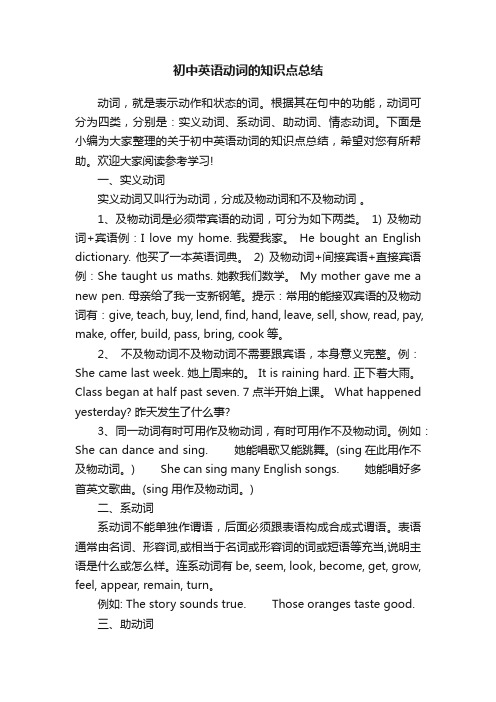
初中英语动词的知识点总结动词,就是表示动作和状态的词。
根据其在句中的功能,动词可分为四类,分别是:实义动词、系动词、助动词、情态动词。
下面是小编为大家整理的关于初中英语动词的知识点总结,希望对您有所帮助。
欢迎大家阅读参考学习!一、实义动词实义动词又叫行为动词,分成及物动词和不及物动词。
1、及物动词是必须带宾语的动词,可分为如下两类。
1) 及物动词+宾语例:I love my home. 我爱我家。
He bought an English dictionary. 他买了一本英语词典。
2) 及物动词+间接宾语+直接宾语例:She taught us maths. 她教我们数学。
My mother gave me a new pen. 母亲给了我一支新钢笔。
提示:常用的能接双宾语的及物动词有:give, teach, buy, lend, find, hand, leave, sell, show, read, pay, make, offer, build, pass, bring, cook等。
2、不及物动词不及物动词不需要跟宾语,本身意义完整。
例:She came last week. 她上周来的。
It is raining hard. 正下着大雨。
Class began at half past seven. 7点半开始上课。
What happened yesterday? 昨天发生了什么事?3、同一动词有时可用作及物动词,有时可用作不及物动词。
例如:She can dance and sing. 她能唱歌又能跳舞。
(sing在此用作不及物动词。
) She can sing many English songs. 她能唱好多首英文歌曲。
(sing用作及物动词。
)二、系动词系动词不能单独作谓语,后面必须跟表语构成合成式谓语。
表语通常由名词、形容词,或相当于名词或形容词的词或短语等充当,说明主语是什么或怎么样。
易混动词辨析(初中英语专题复习)

易混动词辨析(初中英语专题复习)【易混辨析】【图解助记】cost /pay/ take /spend的区别:cost 的主语通常是事或物(包括形式主语it),不能是人;pay 的主语只能是人,常与for连用;spend 的主语也只能是人,构成spend on sth.或spend in doing sth.;take的主语常常是形式主语it。
如:The computer cost (me) $2000. 这台电脑花了(我) 2000 美元。
I have spent all day looking for you. 我花了一整天来找你。
It took him an hour to write the letter. 他写这封信花了一个小时。
She paid 10 yuan for this book. 她买这本书花了10元钱。
1.keep作及物动词,意为"使……保持(某种状态)"、"使得……"时,常用于以下几种结构:(1)keep+宾语(由人或物充当)+形容词。
Keep your hands clean. 手要保持干净。
(2)keep+宾语+副词。
What have kept you awa for so long? 什么事使你离开这么久?(3)keep+宾语+v-ing。
I’m sorry to have kept you waiting. 对不起,让你久等了。
(4)keep+宾语+v-ed。
Keep the door clsed. 让门关着。
(5)keep+宾语+介词短语。
Don’t keep your hands in your pockets. 不要把手插在口袋里。
2.keep作及物动词,后接名词作宾语,构成动宾结构,意为"保存"、"保留"、"记(日记等)"、"经营(商店等)"、"遵守(诺言等)"之意。
I keep a diary in English.我用英文记日记。
She keeps a bllkstore.她经营一家书店。
初中英语常用短语动词搭配以及辨析

初中英语常用短语动词搭配以及辨析本文为您提供初中英语常用短语动词搭配以及它们的辨析。
掌握这些动词搭配可以帮助您更准确地运用英语表达。
- go to: 去某个地方(一般是到一个特定的地点)- go at: 去到某个时间或地点2. take/give + advice- take advice: 接受建议- give advice: 给予建议3. make/do + a decision- make a decision: 做出决定- do a decision: 错误用法,应改为 "make a decision"4. look/watch/see + a movie- look at a movie: 错误用法,应改为 "watch a movie" - see a movie: 看电影5. need/want/require + help- need help: 需要帮助- want help: 想要帮助- require help: 需要帮助(通常指特定的要求)6. listen/hear + to- listen to: 听某个声音或音乐- hear: 听到某个声音7. take/give + a test- take a test: 参加一次考试- give a test: 发布一次考试8. do/make + your best- do your best: 尽力而为- make your best: 错误用法,应改为 "do your best"以上是初中英语常用的一些动词搭配以及它们的辨析。
希望对您的学习有所帮助!。
初中英语易混动词辨析

易混动词及短语动词1.beat和win的区别beat表示“打败”,后面跟的宾语是对手;win表示“赢得”,后面跟比赛或活动等作宾语。
如:They beat the Giants by a score of 7 to 3. 他们以7比3战胜了巨人队。
Though it was not easy, they won the game at last. 虽然不容易,他们最后还是赢了比赛。
2.carry, take与bring的区别take是指将某物或某人从这里“带到”或“拿到”某处。
bring与take相反,是指将某物或某人从别处“带来”或“拿来”。
carry是指随身携带(背着、扛着、提着、抱着),不表明来去的方向。
fetch常指从说话地到另外一个地店,取回某物。
如:Please help me take it to the classroom. 请帮我把它拿到教室去。
May I bring Tom to see you next Monday? 我下周一能带Tom来见你吗?The box is heavy. Can you carry it? 这个盒子太重了,你能拿得起来吗?Fetch a glass of water for me, please. 请给我拿杯水来。
3.cross和across的区别cross与across都表示“穿过;横过"的意思。
但是cross 是及物动词,across是介词,across 是前面必须还要有谓语动词。
如:Is it safe to cross the road now? 现在过马路安全吗?Go across the bridge. You'll find the museum on the left. 走过这座桥,你就会在左边找到那个博物馆。
4.hear与listen to的区别动词hear与listen to之间的区别,同see与look at之间的区别非常相似。
初中英语语法知识点整理总结-动词

初中英语语法知识点整理总结-动词动词是句子的中心词,用来表示人或物的动作、状态、变化等。
掌握动词的正确使用对于研究英语语法至关重要。
以下是初中英语动词知识点的整理总结:1. 动词的分类- 及物动词:表示动作的动词,需要带宾语才能构成完整的意义。
例如:read(读),eat(吃)。
- 不及物动词:表示动作的动词,不需要带宾语。
例如:run (跑),sleep(睡觉)。
- 连系动词:表示状态的动词,连接主语和表语,没有实际意义。
例如:be(是),seem(似乎)。
2. 动词的时态- 现在时:表示目前正在进行的动作或状态。
例如:I read a book.(我正在读一本书。
)- 过去时:表示过去发生的动作或状态。
例如:She ate an apple yesterday.(她昨天吃了一个苹果。
)- 将来时:表示将来要发生的动作或状态。
例如:They will go to the zoo tomorrow.(他们明天会去动物园。
)3. 动词的语态- 主动语态:表示主语是动作的执行者。
例如:Jim cleans the room.(吉姆打扫房间。
)- 被动语态:表示主语是动作的承受者。
例如:The room is cleaned by Jim.(房间被吉姆打扫了。
)4. 动词的情态- can:表示能力或许可。
例如:She can swim.(她会游泳。
)- must:表示必须。
例如:You must finish your homework.(你必须完成你的作业。
)- should:表示建议或义务。
例如:You should help others.(你应该帮助别人。
)以上是初中英语动词的一些基本知识点,希望对你的研究有所帮助。
整书:中考英语名词、动词、形容词词义辨析全汇总(所有单词均已归类)
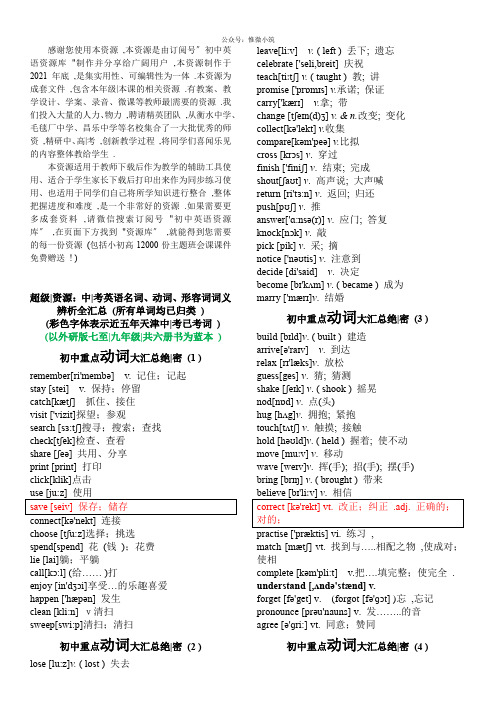
感谢您使用本资源,本资源是由订阅号〞初中英语资源库"制作并分享给广阔用户,本资源制作于2021年底,是集实用性、可编辑性为一体.本资源为成套文件,包含本年级|本课的相关资源.有教案、教学设计、学案、录音、微课等教师最|需要的资源.我们投入大量的人力、物力,聘请精英团队,从衡水中学、毛毯厂中学、昌乐中学等名校集合了一大批优秀的师资,精研中、高|考,创新教学过程,将同学们喜闻乐见的内容整体教给学生.本资源适用于教师下载后作为教学的辅助工具使用、适合于学生家长下载后打印出来作为同步练习使用、也适用于同学们自己将所学知识进行整合,整体把握进度和难度,是一个非常好的资源.如果需要更多成套资料,请微信搜索订阅号"初中英语资源库〞,在页面下方找到"资源库〞,就能得到您需要的每一份资源(包括小初高12000份主题班会课课件免费赠送! )超级|资源:中|考英语名词、动词、形容词词义辨析全汇总(所有单词均已归类) (彩色字体表示近五年天津中|考已考词)(以外研版七至|九年级|共六册书为蓝本)初中重点动词大汇总绝|密(1 ) remember[ri'membə] v. 记住;记起stay [stei] v. 保持;停留catch[kætʃ] 抓住、接住visit ['vizit]探望;参观search [sɜ:tʃ]搜寻;搜索;查找check[tʃek]检查、查看share [ʃeə] 共用、分享print [print] 打印click[klik]点击choose [tʃu:z]选择;挑选spend[spend] 花(钱);花费lie [lai]躺;平躺call[kɔ:l] (给…… )打enjoy [in'dʒɔi]享受…的乐趣喜爱happen ['hæpən] 发生clean [kli:n] v清扫sweep[swi:p]清扫;清扫初中重点动词大汇总绝|密(2 )lose [lu:z]v. ( lost ) 失去leave[li:v] v. ( left ) 丢下; 遗忘celebrate ['seli,breit] 庆祝teach[tiːtʃ] v. ( taught ) 教; 讲promise ['prɒmɪs] v.承诺; 保证carry['kærɪ] v.拿; 带change [tʃeɪn(d)ʒ] v. & n.改变; 变化collect[kə'lekt] v.收集compare[kəm'peə] v.比拟cross [krɔs] v. 穿过finish ['finiʃ] v. 结束; 完成shout[ʃaʊt] v. 高声说; 大声喊return [ri'tɜ:n] v. 返回; 归还push[pʊʃ] v. 推answer['ɑ:nsə(r)] v. 应门; 答复knock[nɔk] v. 敲pick [pik] v. 采; 摘notice ['nəʊtis] v. 注意到decide [di'said] v. 决定become [bɪ'kʌm] v. ( became ) 成为marry ['mærɪ]v. 结婚初中重点动词大汇总绝|密(3 )build [bɪld]v. ( built ) 建造arrive[ə'raɪv] v. 到达relax [rɪ'læks]v. 放松guess[ges] v. 猜; 猜测shake [ʃeɪk] v. ( shook ) 摇晃nod[nɒd] v. 点(头)hug [hʌg]v. 拥抱; 紧抱touch[tʌtʃ] v. 触摸; 接触hold [həʊld]v. ( held ) 握着; 使不动move [muːv] v. 移动wave [weɪv]v. 挥(手); 招(手); 摆(手)bring [brɪŋ] v. ( brought ) 带来match [mætʃ] vt. 找到与…..相配之物,使成对;使相complete [kəm'pli:t] v.把….填完整;使完全. understand [,ʌndə'stænd] v.forget [fə'get] v. (forgot [fə'ɡɔt] )忘,忘记pronounce [prəu'nauns] v. 发……..的音agree [ə'ɡri:] vt. 同意;赞同初中重点动词大汇总绝|密(4 )miss [mis] v. 未击中;未到达 book [buk] vt. 预订park [p ɑ:k] vt. 停放 (车 );泊 (车)cost [kɔst] vt. 花费;价钱为 .n. show [ʃəu] vt.allow [ə'lau] vt. 允许;准许raise [reiz] vt. 抚养;筹集 (钱款 );养育; set [set] v.设置;设定初中重点动词大汇总绝|密 (5 ) develop [di'veləp] v. 研制;制定feed [fi:d] vt. (fed [fed] )喂养;饲养 fall [f ɔ:l] vi. 下落;跌落follow ['f ɔl əu] vt. 跟随;紧跟 land [lænd] v. 降落appear [ə'piə] vi. 出现;显露 bite [bait] vt. (bi[biti] )咬;叮 climb [klaim] vi. 爬;攀爬 throw [θrəu] vt. 投;掷increase [in'kri:s] v.增大;增长 accept [ək'sept] v. 收受;接受 imagine [i'mædʒin] vi. 想像;设想 drop [drɔp] vt. 投下;使落下 cover ['kʌvə] v. 盖;盖上 warn [w ɔ:n] vt. 警告 ,告诫keep [ki:p] vt. (kept [kept] )保持;留在 enter ['entə(r)] (使 )参加; (使 )|报名初中重点动词大汇总绝|密 (6 )afford [ə'fɔ:d] v. (有财力 )买得起;付得起 invite [ɪn'vaɪt] 邀请move [mu:v] 搬家;改变…的位置send (sent )[send] 派遣去;命令…去 reach [ri:tʃ] 到达;抵达discover [dɪ'skʌvə(r)] 发现;找到communicate [kə'mju:nɪkeɪt] 联系;交流 cough [kɒf] 咳嗽(n.);咳嗽 (v. )fight [fa ɪt] v.与…战斗/n.战斗;斗争 satisfy [ˈsæt ɪsfa ɪ] 满足;使满意separate ['sepr ət] v.使分开;分隔 explain [ɪk'sple ɪn] 解释;说明 refuse [r ɪ'fju:z] 拒绝| regret [r ɪ'ɡret] 懊悔;遗憾初中重点动词大汇总绝|密(7 ) avoid [ə'v ɔɪd] 防止;防止 remain [rɪˈmeɪn] v. 逗留 ,留下 grow [grəʊ] v. 种植 ,栽培(植物) lay (laid, laid)[leɪ] v.摆放(餐桌)attend[əˈtend] v. 上(学) ,出席 ,参加(事件或活动)treat [tri:t] v. 医治 ,治疗realise['rɪəlaɪz] v. 了解 ,意识到manage[ˈmænɪdʒ]v. 做成 ,(尤指)设法完成 continue[kənˈtɪnju: ] v. (使)继续 punish [ˈpʌnɪʃ] v. 惩罚 ,惩办 consider [kənˈsɪdə]v. 考虑 ,斟酌 control [kənˈtrəʊl]v. 操作 ,操纵 dig (dug, dug)[dɪg]v. 挖掘 ,掘(洞) discuss [dɪˈskʌs]v. 讨论 ,谈论influence[ˈɪnfluəns] v. 影响 ,作用于suppose [səˈpəʊz]v. 猜测 ,推测 ,相信 ,认为 escape [ɪˈskeɪp] v. 逃离 ,逃脱初中重点动词大汇总绝|密(8 )result[rɪˈzʌlt] v. (因…而)产生,发生spread (spread, spread)v. 扩展,蔓延,传播store[stɔ:] v. 存储,储藏replace[rɪˈpleɪs] v. 替换,取代brush[brʌʃ] v. (用刷子)刷present[ˈpreznt] v. 授予,呈递pollute[pəˈlu:t]v. 污染recycle[ˌri:ˈsaɪkl] v. 回收利用,再使用(废品) reuse[ˌri:ˈju:z] v. 再次使用,重复利用divide[dɪˈvaɪd] v. 分开repeat[rɪˈpi:t] v. 重说,重新做succeed/səkˈsi:d/v.成功;做成starve/stɑ:v/v.挨饿;饿死expect/ɪkˈspekt/v.预料;预计require/rɪˈkwaɪə/v.需要harm/hɑ:m/v.损害;伤害serve/sɜ:v/v.端上(食物和饮料);伺候……进餐intend/ɪ nˈtend/v.方案;打算achieve/əˈtʃi:v/v.成功;实现初中重点抽象名词大汇总绝|密(1 ) grade [greid] n.年级|capital ['kæpit(ə)l] n.首|都;省会theatre ['θiətə] n 剧院family['fæmili; -m(ə)l -] n.家,家庭science['saiəns] n.科学;科学课room[ru:m; rʊm] n.房间;室;屋子subject['sʌbdʒikt]科目maths[mæθs]数学geography [dʒi'ɒgrəfi]地理history ['hist(ə)ri] 历史art[ɑ:t] 美术;艺术break [breik] (课间)休息kitchen ['kitʃin; -tʃən]厨房country ['kʌntri] 国|家internet ['intənet] 因特网customer['kʌstəmə]顾客company['kʌmpəni]公司;剧团document['dɒkjʊmənt] 文件information [infə'meiʃn] 信息secret ['si:krit]秘密初中重点抽象名词大汇总绝|密(2 ) magazine [,mægə'zi:n]杂志exercise['eksə,saiz] 锻炼;练习moment ['məʊmənt]的时刻,时候festival ['festivl] 节日programme['prəʊgræm]节目term[tɜːm] n.学期board[bɔːd] n.布告板country['kʌntrɪ] n.乡下; 乡村sightseeing ['saɪtsiːɪŋ] n.观光; 游览machine[mə'ʃiːn] n.机器space[speɪs] n.太空; 空间traffic['træfɪk] n.交通market['mɑːkɪt] n.市场sale[seɪl] n.降价出售price[praɪs] n.价格advantage [əd'vɑːntɪdʒ] n.优势product ['prɒdʌkt]n.产品tourist ['tʊərist] n.游客square[skweə(r)] n.广场初中重点抽象名词大汇总绝|密(3 ) village['vɪlɪdʒ] n.村庄store [stɔː] n. 商店president ['prezɪd(ə)nt]n. 总统language ['læŋgwɪdʒ] n. 语言fire ['faɪə] n.火; 火灾poem ['pəʊɪm] n.诗歌spelling ['speliŋ] n. 拼写;拼字sentence ['sentəns] n. 句子dictionary ['dikʃənəri] n. 字典;词典grammar ['ɡræmə] n. 语法letter ['letə] n. 信;字母mistake [mi'steik] n. 错误;过错vocabulary [vəu'kæbjuləri] n. 词汇pronunciation [prəu,nʌnsi'eiʃən] n. 发音advice [əd'vais] n. 建议;意见century ['sentʃʊrɪ] n. 世纪composer [kəm'pəʊzə] n. 作曲家century ['sentʃʊrɪ] n. 世纪composer [kəm'pəʊzə] n. 作曲家conversation [,kɔnvə'seiʃən] n. 交谈初中重点抽象名词大汇总绝|密(4 ) population [,pɔpju'leiʃən] n.人口university [,ju:ni'və:səti] n. 大学mountain [`mauntin] n. 山;山岳countryside ['kʌntri,said] n. 农村地区,umbrella [ʌm'brelə] n. 雨伞matter ['mætə] n.问题;麻烦practice ['præktis] n. 练习danger ['deindʒə] n. 危险;危害society [sə'saiəti] n. 社会journey ['dʒə:ni] n. 旅行;旅程accident ['æksidənt] n. 交通事故chance [tʃɑ:ns] n. 时机,可能性peace [pi:s] n. 和平;太平notice ['nəutis] n. 告示,布告situation [,sitju'eiʃən] n. 情况;形势research [ri'sə:tʃ] n. 研究;探讨scientist ['saiəntist] n. 科学家government ['ɡʌvənmənt] n. 政府nature ['neitʃə] n. 大自然;自然界symbol ['simbəl] n. 象征;标志初中重点抽象名词大汇总绝|密(5 ) pocket ['pɔkit] n. 口袋;衣袋medicine ['medisin] n. 药;药物degree [di'ɡri:] n. 度数;度service ['sə:vis] n. 效劳,公共效劳difference ['difərəns] n. 差异;差异surprise [sə'praiz] n. 惊奇;意外之事. tradition [trə'diʃən] n. 传统习俗example [iɡ'zɑ:mpl] n. 例子;实例experience [ik'spiəriəns] n. 经验;经历stairs [steəz] n. 楼梯;梯级|trouble ['trʌbl] n. 麻烦;烦恼;困难power [pauə] n. 电力competition[ˌkɒmpəˈtɪʃn]比赛;竞争mark [mɑ:k]分数hobby ['hɒbɪ]业余爱好message ['mesɪdʒ]口信;信息favourite['feɪvərɪt]最|喜欢的人或事planet ['plænɪt]行星project [prəˈdʒekt]方案;工程;工程environment [ɪn'vaɪrənmənt]环境初中重点抽象名词大汇总绝|密(6 ) solar ['səʊlə(r)]太阳的system ['sɪstəm]系统;体系group [ɡru:p]群;组universe [ˈju:nɪvɜ:s]宇宙galaxy ['ɡæləksɪ]星系communicate [kə'mju:nɪkeɪt]联系;交流member [ˈmembə(r)]成员;会员condition[kənˈdɪʃn]状况;身体状况fight [faɪt]v.与…战斗/n.战斗;斗争shelf [ʃelf]隔板;架子activity [æk'tɪvətɪ]活动skill [skɪl]技能;技艺value ['vælju:]价值;有用性success [sək'ses]成功;成就pleasure ['pleʒə(r)]愉悦;快乐weight [weɪt]重量guest [ɡest]客人;宾客form [fɔ:m]v.形成;n.表格friendship ['frendʃɪp]友谊;友好square [skweə(r)]平方的初中重点抽象名词大汇总绝|密(7 ) shape [ʃeɪp]外形;形状path [pɑ:θ]小路;路径mention ['menʃn]提及;谈到article ['ɑ:tɪkl]文章;|报道presenter [prɪˈzentə(r)]主持人background [ˈbækgraʊnd]背景;后景suggestion [səˈdʒestʃən]提议;建议treasure ['treʒə(r)]珍宝;珍贵之物weight [weɪt]重量guest [ɡest]客人;宾客form [fɔ:m]v.形成;n.表格friendship ['frendʃɪp]友谊;友好初中重点形容词大汇总绝|密(1 ) right[rait] adj. 正确的,对的sweet [swi:t] adj. 甜的bad [bæd] adj.坏的;不好的healthy ['helθi] adj.健康的delicious [di'liʃəs] adj.美味的tired[taiəd] adj. 劳累的important [im'pɔ:t(ə)nt] adj. 重要的difficult['difik(ə)lt] 困难的,难懂的interesting ['intrəstiŋ]有趣的busy['bizi] 忙的繁忙的different['difrənt] 不同的dangerous['deindʒərəs] 危险的cute[kju:t] 可爱的funny['fʌni] 有趣的little ['litl] 极少量的large[lɑ:dʒ]大的、巨大的strong[strɒŋ] 强壮的、强大的;强烈的great [greit]太好了;巨大的;超乎寻常的special ['speʃl]特别的,特殊的happy ['hæpi]快乐的,幸福的初中重点形容词大汇总绝|密(2 ) expensive [ik'spensiv]昂贵的afraid [ə'freid]担忧的害怕的ready['redi]有准备的;准备好的beautiful['bju:təfl]漂亮的,美丽的hard[hɑ:d] adv. 努力地careful ['kεəful] adj.仔细的; 认真的; 小心的strange [streindʒ] adj.奇怪的lucky ['lʌki] 幸运的merry ['meri] 愉快的;快乐的traditional [trə'diʃnəl] 传统的fit [fɪt] adj.健康的;强健的tidy ['taɪdɪ]adj.整齐的; 整洁的; 爱整洁的beautiful['bjuːtɪfʊl; -f(ə)l] adj.美的; 美丽的free [friː] adj. (时间)空闲的; 空余的true [truː] adj.真的; 真实的cheap [tʃiːp] adj.廉价的fresh[freʃ] adj.新鲜的safe[seɪf] adj. 平安的several ['sev(ə)r(ə)l]adj.几个; 一些online [ɒn'laɪn] adj.在线的初中重点形容词大汇总绝|密(3 ) famous['feiməs] adj. 著名的clear[kliə(r)] adj. (天气)晴朗的high [hai] adj. 高的strict [strɪkt] adj. 严格的; 严厉的born [bɔːn] adj. (动词bear的过去分词)出生nice [naɪs] adj. 友好的; 亲切的good [gʊd] adj. 乖的; 守规矩的difficult ['dɪfɪk(ə)lt]adj. 难对付的bored [bɔːd]adj. 厌烦的; 厌倦的last adj. (星期、月份等)最|近过去的,紧接现在前面的lost [lɒst] a dj. 迷路的hungry ['hʌŋgri] adj. 感到饿的; 饥饿的right [rait] adj. 适宜的; 恰当的asleep[ə'sli:p] adj. 睡着的real [riːl]adj.真实的; 真正的exact[ɪg'zækt; eg -] adj. 准确的; 确切的successful [sək'sesfʊl; -f(ə)l] adj. 成功的rich [rɪtʃ] adj. 富有的young [jʌŋ]adj. 年轻的world -famous adj. 举世闻名的初中重点形容词大汇总绝|密(4 ) wonderful ['wʌndəfʊl; -f(ə)l]adj. 绝|妙的; 了不起的rude[ruːd] adj. 粗鲁的; 无礼的polite [pə'laɪt] adj. 礼貌的foreign['fɒrɪn] adj. 外国的personal['pɜːs(ə)n(ə)l] adj. 个人的lively ['laɪvlɪ] adj. 活泼的; 轻快的modern ['mɒd(ə)n] adj. 现代的noisy['nɒɪzɪ] adj. 吵闹的western ['west(ə)n]adj. 西方的possible ['pɔsəbl] adj. 可能的natural ['nætʃərəl] adj. 合理的;符合常情的main [mein] adj. 主要的,最|大的excellent ['eksələnt] adj. 极好的;极好的poor [pɔː; pʊə] adj. 贫穷的perfect ['pɜːfɪkt] adj. 完美的classical ['klæsɪk(ə)l]adj. 经典的; 古典的boring ['bɔ:riŋ] adj. 无聊的;烦人的exciting [ik'saitiŋ] adj.使人兴奋的;令人冲动的relaxing [ri'læksiŋ] adj. 令人愉悦的;使人轻松的enjoyable [in'dʒɔiəbl] adj. 有乐趣的;令人愉快的初中重点形容词大汇总绝|密(5 ) careless ['kεəlis] adj. 粗心的;疏忽的common ['kɔmən] adj. 普通的;一般的close [kləuz] adj. (距离上)近点,接近的crowded ['kraudid] adj. 拥挤的;人数过多的confident ['kɔnfidənt] adj. 自信的pleased [pli:zd] adj. 开心的;满足的usual ['ju:ʒuəl] adj. 通常的,平常的magic ['mædʒik] adj.魔术的;戏法的thin [θin] adj. 细长的;瘦的interested ['intristid] adj. 关心的,感兴趣的wild [waild] adj. 野生的;n.野生环境enough [i'nʌf] adj. 充分的;足够的quiet ['kwaiət] adj. 安静的;寂静的local ['ləukəl] adj. 当地的;本地的public ['pʌblik] adj. 公众的;公共的terrible ['terəbl] adj. 可怕的;使人烦恼的broken ['brəukən] adj. 破碎的serious ['siəriəs] adj. 认真严肃的;不开玩笑的medical ['medikəl] adj. 医学的;医疗的初中重点形容词大汇总绝|密(6 ) harmful ['hɑ:mful] adj. 有害的clear [kliə] adj. 不和….接触的;不挨….太近的;v. 清calm [kɑ:m] adj. 镇静的,沉着的brave [breiv] adj. 勇敢的;无畏的helpful ['helpful] adj. 提供帮助的;有用的ancient ['eɪnʃənt]古老的;古代的pretty ['prɪtɪ]秀丽的;标致的nervous ['nə:vəs]情绪不安的;紧张的latest [ˈleɪtɪst]最|近的;最|新的solar ['səʊlə(r)]太阳的;与太阳有关的impossible [ɪmˈpɒsəbl]不可能的ugly ['ʌɡlɪ]难看的;丑陋的handsome ['hænsəm]漂亮的;英俊的smart [smɑ:t]机灵的;聪明的awful [ˈɔ:fl]极讨厌的;极坏的daily ['deɪlɪ]每天的;天天的weak[wi:k]弱的;虚弱的sleepy['sli:pɪ]想睡的;困的active [ˈæktɪv]积极的;活泼的初中重点形容词大汇总绝|密(7 ) clever ['klevə(r)]聪明的;机灵的thirsty ['θɜ:stɪ]渴的certain [ˈsə:tn]确定的;无疑的total ['təʊtl]总的;全部的crazy ['kreɪzɪ]发疯的;荒唐的own [əʊn]自己的private ['praɪvət]私人的;个人的valuable [ˈvæljuəbl]值钱的;有价值的patient ['peɪʃnt]有耐心的;能忍耐的bright [braɪt]欢快的;明亮的national ['næʃnəl]国|家的;国内的international[ˌɪntə'næʃnəl]国际的;世|界的loud [laʊd] adj. (声音)响亮的silent[ˈsaɪlənt] adj. 寂静的silver[ˈsɪlvə] adj. 银灰色的,银制的simple [ˈsɪmpl] adj. 简单的,容易的useful[ˈju:sfl] adj. 有用的,有益的dying[ˈdaɪɪŋ] adj. 垂死的,即将死亡的amazing[əˈmeɪzɪŋ] adj. 惊人的,极好的empty[ˈempti] adj. 空的初中重点形容词大汇总绝|密(8 ) unable[ʌnˈeɪbl] adj. 不能做某事的missing[ˈmɪsɪŋ]adj. 找不到的,失踪的honest [ˈɒnɪst] adj. 老实的,老实的necessary[ˈnesəsəri] adj. 必要的,必需的musical[ˈmju:zɪkl]adj. 音乐的wise[waɪz]adj. 有判断力的,明智的well -known['wel'nəʊn] adj.众所周知的,著名的surprised[səˈpraɪzd] adj. 惊奇的,惊讶的alive[əˈlaɪv]adj. 活着的fair[feə] adj. 公平的,合理的powerful[ˈpaʊəfl] adj. 有影响力的,能控制他人的electronic[ɪˌlekˈtrɒnɪk] adj.电子的varied[ˈveərid] adj. 各种各样的,各不相同的single[ˈsɪŋgl]adj. 仅一个的,单个的central[ˈsentrəl]adj. 中|心的,在中间的magical[ˈmædʒɪkl] adj. 神奇的,迷人的hopeless[ˈhəʊpləs] adj. 无望的general[ˈdʒenrəl]adj. 整体的,普遍的lazy[ˈleɪzi] adj. 懒惰的,懒散的rapid[ˈræpɪd] adj. 快速的,迅速的初中重点形容词大汇总绝|密(9 ) man -made[ˈmænˈmed] adj. 人造的natural[ˈnætʃrəl] adj. 大自然的stupid /ˈstju:pɪd/adj.笨的;糊涂的absent/ˈæbsənt/adj.缺席的;不在的wealthy/ˈwelθi/adj.富有的;富裕的spare/speə/adj.空余的;备用的tiny/ˈtaɪni/adj.微小的;极小的proper/ˈprɒpə/adj.适宜的,适当的straight/streɪt/adj.直的;笔直的sudden/ˈsʌdn/adj.突然的;急剧的soft/sɒft/adj.软的;柔软的still /stɪl/adj.静止的;不动的physical/ˈfɪzɪkl/adj.身体的;体力的similar/ˈsɪmələ/adj.相似的cross/krɒs/adj.生气的disappointed /ˌdɪsəˈpɔɪntɪd/adj.失望的;沮丧的present 出席excited 令人兴奋的副词词义辨析finally ['fainəli]最|后always ['ɔ:lweiz] 总是;一直quite[kwait]十分;相当fast [fɑːst] adv.快地;快速地else[els] adv.其他; 另外maybe ['meɪbiː; -bɪ] adv.也许early ['ɜːlɪ] adv.早; 提前certainly['sɜːt(ə)nlɪ; -tɪn -] adv.当然; 行almost ['ɔːlməʊst]adv.几乎; 差不多together [tə'geðə]adv. 一起; 共同pretty ['priti] adv. 相当地,非常,很quickly ['kwikli] adv. 迅速地;快地loudly ['laudli] adv. 大声地,响亮地round [raund] adv. 围绕地immediately [i'mi:diətli] adv. 立即,立刻nearly [ˈnɪəli] adv. 几乎,差不多simply[ˈsɪmpli] adv. 实在,确实actually [ˈæktʃuəli] adv. 事实上properly[ˈprɒpəli] adv. 适宜地,正确地mainly [ˈmeɪnli] adv. 大局部地,主要地recently[ˈri:sntli] adv. 最|近,近来direct /dɪˈrekt/ adv.径直地;直接地exactly /ɪgˈzæktli/ adv.确切地;完全;/口/ (表示fairly /ˈfeəli/ adv.相当;还算。
中考英语“动词”考点复习总结和解

中考英语,“动词”考点总结和解题思路。
助力中考,初中英语学法指导在英语中,构成句子的重要成分就是动词。
无论什么样的句子都离不开动词的连接。
缺少了动词的句子是不完整的。
如果将英语比作人,那么动词就是人体中的骨骼,起到了整体支撑的作用,其他知识点就是血肉,由此可见动词在英语中的重要性。
什么是动词呢?动词就是表示动作中状态的词。
每年的中考英语试卷中动词的考点和比重最多。
动词都考哪些内容呢?1、动词的形式每个动词有五种形式分别为原形、单三、现在分词、过去式和过去分词,如go-goes-going-went-gone 。
2、动词的分类①实义动词:及物和不及物,②Be动词:be,look,sound,taste,smell,become,turn,③助动词:be,have,do,④情态动词:can,may,must,should,might。
3、动词在句中的成分两种成分一种是可以作谓语;另一种是不做谓语,也就是非谓语。
非谓语有三种形式,不定式,动名词,分词(过分和现分)。
同学们要知道,在初中阶段,重点考察动词后跟不定式和现在分词的区别。
4、动词时态①一般现在时:概念:表经常性习惯性发生的动作或存在的状态或一个事实。
结构:主语+be+其他。
标志词:sometimes,usually,always,often,everyday。
用法:在宾语从句和定语从句中考察。
②一般过去时。
③现在进行时。
④过去进行时。
⑤一般将来时。
⑥过去将来时。
⑦现在完成时。
⑧过去完成时,同以上的总结方法一致。
需要同学们在学习或复习中学会总结。
5、动词语态这是我们中考考查的重点,这里给大家总结类型和其中一部分例子:1)动词+介词:如deal with,look for,agree with,suffer from,put on等2)动词+副词:如turn up,turn off,pick up,put off,stay up,turn off,3)动词+副词+介词:如look forward to,come up with.7、动词辨析常见的动词词义辨析如下,我们可以用口诀来记忆:“2找,3借3穿3到达3参加,4看4花费4输赢,5感官”具体如下:“2”找look for,find;“3”借borrow,lend,keep;“3”穿dress,put on,wear;“3”到达get,arrive,reach;“3”参加join,attend,take part in;“4”看see,look,watch,read;“4”花费spend,cost,take,pay ;“4”输赢lose,fail,win,beat;“5”感官feel,sound,look,smell,hear。
初中英语英语实义动词用法辨析
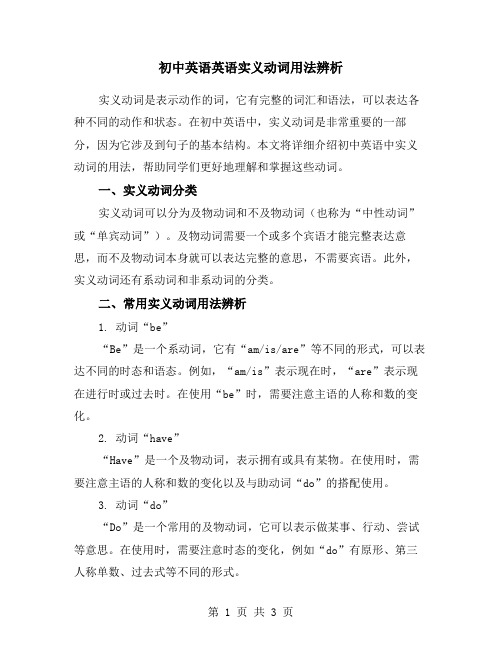
初中英语英语实义动词用法辨析实义动词是表示动作的词,它有完整的词汇和语法,可以表达各种不同的动作和状态。
在初中英语中,实义动词是非常重要的一部分,因为它涉及到句子的基本结构。
本文将详细介绍初中英语中实义动词的用法,帮助同学们更好地理解和掌握这些动词。
一、实义动词分类实义动词可以分为及物动词和不及物动词(也称为“中性动词”或“单宾动词”)。
及物动词需要一个或多个宾语才能完整表达意思,而不及物动词本身就可以表达完整的意思,不需要宾语。
此外,实义动词还有系动词和非系动词的分类。
二、常用实义动词用法辨析1. 动词“be”“Be”是一个系动词,它有“am/is/are”等不同的形式,可以表达不同的时态和语态。
例如,“am/is”表示现在时,“are”表示现在进行时或过去时。
在使用“be”时,需要注意主语的人称和数的变化。
2. 动词“have”“Have”是一个及物动词,表示拥有或具有某物。
在使用时,需要注意主语的人称和数的变化以及与助动词“do”的搭配使用。
3. 动词“do”“Do”是一个常用的及物动词,它可以表示做某事、行动、尝试等意思。
在使用时,需要注意时态的变化,例如“do”有原形、第三人称单数、过去式等不同的形式。
4. 动词“play”“Play”是一个常用的及物动词,表示玩耍、演奏乐器等意思。
在使用时需要注意人称和数的变化,以及与其他介词的搭配使用。
5. 动词“go”“Go”是一个常用的及物动词,表示前往某地、行动、做某事等意思。
在使用时需要注意与时间副词(如“to”、“on”)的搭配使用。
6. 其他常用实义动词除了上述常用实义动词外,还有许多其他的常用实义动词可以表达不同的动作和状态。
例如,“come”、“go”、“get”、“make”、“take”、“find”、“eat”、“drink”、“make”、“buy”、“put”、“go”、“like”、“love”、“hate”、“forget”、“remember”、“try”等。
初中英语常用词语辨析完整版
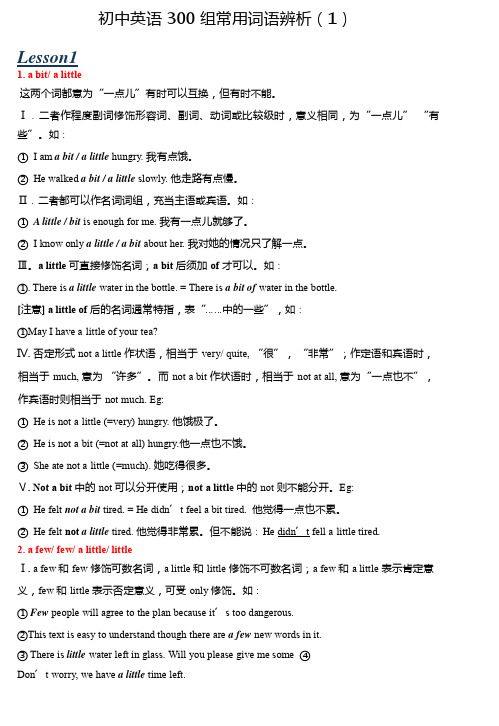
初中英语 300 组常用词语辨析(1)Lesson11. a bit/ a little这两个词都意为“一点儿”有时可以互换,但有时不能。
Ⅰ.二者作程度副词修饰形容词、副词、动词或比较级时,意义相同,为“一点儿”“有些”。
如:①I am a bit / a little hungry. 我有点饿。
②He walked a bit / a little slowly. 他走路有点慢。
Ⅱ.二者都可以作名词词组,充当主语或宾语。
如:①A little / bit is enough for me. 我有一点儿就够了。
②I know only a little / a bit about her. 我对她的情况只了解一点。
Ⅲ。
a little 可直接修饰名词;a bit 后须加of 才可以。
如:①. There is a little water in the bottle. = There is a bit of water in the bottle.[注意]a little of后的名词通常特指,表“……中的一些”,如:①May I have a little of your tea?Ⅳ. 否定形式 not a little 作状语,相当于very/ quite, “很”,“非常”;作定语和宾语时,相当于much, 意为“许多”。
而not a bit 作状语时,相当于not at all, 意为“一点也不”,作宾语时则相当于not much. Eg:①He is not a little (=very) hungry. 他饿极了。
②He is not a bit (=not at all) hungry.他一点也不饿。
③She ate not a little (=much). 她吃得很多。
Ⅴ. Not a bit中的not 可以分开使用;not a littl e 中的not 则不能分开。
Eg:①He felt not a bit tired. = He didn’t feel a bit tired. 他觉得一点也不累。
初中英语语法 非谓语动词总结

初中英语语法非谓语动词总结非谓语动词主要包括不定式、动名词和现在分词。
为了区分这三种不同的非谓语动词的用法和含义,我们将分别从三种非谓语动词在句子中做主语、宾语、宾语补足语、定语、状语、表语以及一些特殊结构句型等角度来区分其用法和细微含义。
1.不定式和动名词作主语的区别(1)动名词作主语通常表示抽象动作;而不定式作主语表示具体动作。
Smoking is prohibited(禁止)here.这里禁止抽烟。
(抽象)It is not very good for you to smoke so much.你抽这么多烟对你身体很不好。
(具体)(2)动名词作主语时,通常用以表示一件已知的事或经验。
不定式短语通常用来表示一件未完成的事或目的。
Climbing mountains is interesting.爬山很有趣。
(经验)Driving a car during the rush hour is tiring.在高峰时刻开车令人厌烦。
(经验) (3)不定式做主语,一般用it当形式主语,把作主语的不定式短语后置。
It took me only five minutes to finish the job.2.不定式、动名词和分词作表语的区别(1)不定式作表语1)不定式作表语一般表示具体动作,特别是表示将来的动作。
To do two things at a time is to do neither.--次做两件事等于未做。
What I would suggest is to start work at once.我的建议是立刻开始干。
2)如果主语是不定式(表示条件),表语也是不定式(表示结果)。
To see is to believe.百闻不如一见。
To work means to earn a living.工作就是为了生活。
3)如果主语是以aim,duty,hope,idea,happiness,job,plan,problem,purpose,thing,wish等为中心的名词,或以what引导的名词性从句,不定式作表语是对主语起补充说明作用。
- 1、下载文档前请自行甄别文档内容的完整性,平台不提供额外的编辑、内容补充、找答案等附加服务。
- 2、"仅部分预览"的文档,不可在线预览部分如存在完整性等问题,可反馈申请退款(可完整预览的文档不适用该条件!)。
- 3、如文档侵犯您的权益,请联系客服反馈,我们会尽快为您处理(人工客服工作时间:9:00-18:30)。
动词用法辨析(1)“Why not+动词原形+…?”(干嘛不……?)是简略句,完全形式是:Why don’t you +动词原形+…?如:Why not go and have a look?(干嘛不去看看?)Why not try it once again?(为什么不再试试?)(2) be afraid(害怕)的用法:记住几个结构:①be afraid of sth; be afraid of (doing);②be afraid to (do);③be afraid that+从句。
如:She is a little afraid of snakes.(她有点怕蛇)Don’t be so afraid to stay at home alone at night.(别害怕晚上一个人在家)I’m afraid that somebody will take his place because of his serious mistakes.(恐怕有人要取代他了,因为他犯了那么大的错误)(3) make 与do的用法:一般情况下表示进行活动或者做工作用do,表示创造建构某事物用make. 如:I don’t know what to do.(我不知道该干什么)I’m not going to do any work.(我不准备做什么)My father and I once made a boat.(我和我爸曾经做过一只船)此外还要记住一些固定说法:do good / harm / business / one’s best / a favor……make a decision / an effort / a mistake / a noise / a phone call / money / war / the bed / sure,...(4)study、learn的用法:study主要表示“学习、研究”,指过程;learn主要表示“学会”,指结果。
表示“学”时可以互换。
如:How many subjects do you study?(你学多少门课程?)Have you learned it yet?(这个你学过了吗?)How long have you studied/learned English?(你学英语多久了?)learn还可以表示“听说”如:He learned the musician himself was in town.(他听说音乐家本人就在城里)(5)join、join in、take part in的区别:join多指参加组织、团体、党派等,后面跟人时表示和某人一起参加某项活动;join in指参加某项游戏或活动;take part in多指参加群众性的活动、运动、会议等。
如:He joined the army in 2001.(他2001年参军)They joined me in congratulating you.(他们和我一起向你祝贺)Do join us in the game.(千万参加我们的比赛)He took an active part in the students’ movement in the 1940s.(在二十世纪40年代他积极参加学生运动)(6)think of与think about等短语的区别:think of表示“考虑、思念、认为、想起、建议”等;think about表示“看待、认为”think much /highly /a lot of”表示“高度评价…”;think over表示“仔细考虑”;think out表示“想出”。
如:The headmaster thought highly of this boy. (校长高度地评价了这个男孩) We’re thinking of going to France for our holiday. (我们在考虑去法国度假的事情) Think it over and you will have a way. (仔细考虑就有办法)I cannot think of his name. I forgot it. (我想不起他的名字我忘了)-What do you think about his composition?-Very good! (他的作文你觉得怎么样?很好。
)(9)put on、wear、have…on、be in、try on、dress的用法:put on强调“穿戴”这个动作过程,wear则表示“穿着、戴着”这一状态have+衣物+on主要表示状态,be in(+颜色/衣物)也是表示一个状况,dress(+人)表示“给…人穿衣”。
如:Please put on your new shoes.(请穿上你的新鞋)The twins are wearing the same clothes.(双胞胎穿着相同的衣服)Today she has an overcoat on.(今天她穿着一件大衣)Do you know the woman who is in black?(你认识那个身穿黑衣的女人吗?)Dad is dressing Tom now.(爹正在给汤姆穿衣)[注意]dress与wear或put on的区别:wear或put on常用衣物作宾语,而dress常用人作宾语。
表示给自己穿衣时常用“get dressed”或“dress oneself”表达。
be dressed in与wear基本同义。
dress up意为“穿上盛装、乔装打扮”。
如:Could you dress the baby for me?(你能替我给宝宝穿衣吗?)He is eight but can’t dress himself.(他八岁了,还不会穿衣服)She was dressed in a red coat.(她穿着一件红上衣)Do I have to dress up to go to Jim’s party?(我得穿上好衣服去参加吉姆的聚会吗?)(10)speak、talk、say、tell的用法:speak“讲话、发言、演说”,是不及物动词,涉及人时要加介词to,speak作及物动词时后面跟语言名称talk谈话、闲谈”,是不及物动词,涉及人时用介词with、to等,涉及事情时后面跟介词about等;say 是及物动词,后面跟名词、代词、从句等,表示说的内容;tell是及物动词,后面首先要跟人,然后再跟从句或者介词短语等。
如:Do you speak English? (你讲英语吗?)Who spoke at the meeting? (谁在会上发了言?)Our teacher is talking to Lin Tao’s parent. (我们的老师正在跟林涛的家长讲话)Can you say it in English? (你能用英语说出它吗?)Please tell me something about the strange flying object.(请跟我讲讲那个奇怪的飞行物的事情吧)(11)be able to(do)、can的用法:can是情态动词,有许多含义,表示“可能、可以、会”等意思,只有现在式can和过去式could两种形式;be able to表示能力上“会”,有多种时态形式,to后面跟动词原形,有时可以与can/could互换。
如:Can you speak English? (你会说英语吗?)He couldn’t(wasn’t able to) swim when he was 12. (他十二岁时不会游泳)(12)borrow、lend、keep的用法:表示“借”的三个词,borrow“借进”、lend“出借”都是一次性动作,不可以和表示一段的时间状语连用;keep“保存”用来表示借一段时间。
如:I have lost the book I borrowed from my teacher. What can I do?(我丢掉了从老师那里借来的书)How long have you kept my dictionary,eh?For more than two months!(呃,我的字典你借了多久了?两个多月了!)(13)bring、take、carry、send、lift的用法:bring指从远处“拿来”;take指从面前“拿走”;carry指一般的搬运,不涉及方向;send主要指“送、派遣、寄”;lift指把东西由低向高“提起、拎起”。
(14)take、spend、pay、cost的用法:spend的宾语通常是金钱或时间,句型:sb.+(spend)+时间/金钱+on sth / (in) doing sth. ;take的主语通常是事情,句型:sth./It + (take)+sb.+时间+to do… 。
(如果是动作则常用it作形式主语将动词不定式后移);cost的宾语通常是时间、金钱、力气,句型:sth. +(cost)+sb.+时间/金钱/力气. ;pay的宾语通常是金钱,句型:sb.+(pay)+金钱+for+事物.如:She spent the whole night reading the novel. (她花了一个晚上看那本小说) This job will take me two days.=It will take me two days to do the job.(做这件事情要花我两天的时间)How much does a house like this cost? (像这样的房子要花多少钱?)I paid him twenty dollars for the book.. (我花了20元从他那儿买了书)(15)arrive in/at、reach、get to的用法:arrive是不及物动词,到达具体地点时后面加介词at,到达一个大的地方(国家、城市)时后面加介词in,arrive后面可以直接跟地点副词here/there/home等;get表示“到达”时是不及物动词,涉及地点(无论大小)时后面加to,get后面可以直接跟地点副词here等;reach是及物动词,后面直接跟地点名词。
如:He arrived in San Francisco last Sunday. (上个星期天他抵达旧金山) How did you get there in the night? (你是怎样在夜间到达那里的?)We hurried all the way and reached the station just five minutes before the train left.(我们一路狂奔在火车启动前5分钟到达车站)(16)be made of、be made from:be made of指从制成品中可以看得出原材料,be made from则指从制成品中看不出原材料。
